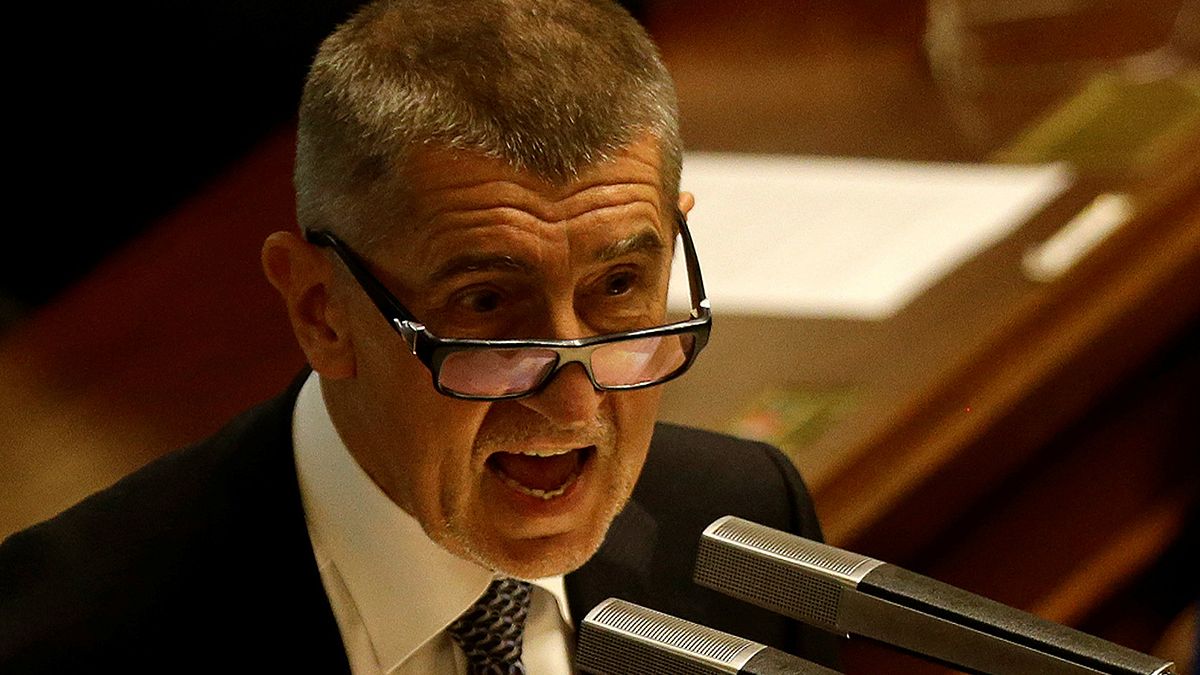Billionaire media mogul Andrej Babiš has been hanging around politicians since the 1990s.
Billionaire media mogul Andrej Babiš has been hanging around politicians since the 1990s.
He is also the founder of a company which has a near monopoly in several sectors of the Czech economy.
But he also wants to be an anti-establishment rebel and voice of ordinary people.
In that regard, he has had some success.
Since he entered politics with his Action of Dissatisfied Citizens (ANO) party six years ago, he has won the 2014 European Parliament election, finished second in the country’s 2013 parliamentary election, and joined the coalition government as a deputy prime minister and finance minister. He’s the second most-trusted politician (trusted by 43 percent of respondents), behind president Miloš Zeman (53 percent).
But, just five months ahead of the country’s next parliamentary election – which his party is predicted to win with some 30 percent support – a scandal has put the brakes on his flourishing career.
On May 2, Babiš was accused by his prime minister, Bohuslav Sobotka, a leader of the rival social democratic party (ČSSD), of using €55 million-worth of tax-free bonds in connection with Agrofert, a conglomerate that he ran before putting his assets into a trust in February. To make matters worse, someone leaked two audio recordings, in which Babiš discussed with a reporter of “Mladá fronta Dnes”, a daily newspaper he also owned until recently, about releasing materials about ČSSD politicians.
Babiš denied doing anything illegal, but two controversies in one week could be too much for a politician who rose to power with the help of anti-corruption slogans, and who several times promised he didn’t put pressure on journalists he hired.
“The bond scandal is not a scandal at all. He just used gap in the law,” said Jan Macháček, Babiš’ adviser.
“But it wasn’t smart of him to talk with this reporter. Still, this somehow humanises him. People who hate him claimed he’s got plenty of bodyguards etc, but if he had some professionals in his service, he would never get recorded.”
Luckily, Babiš found an ally in President Zeman, the prime minister’s antagonist.
Sobotka, in a surprising move, presented the resignation of the whole government, instead of firing only Babiš, saying he didn’t want to make him a martyr. Zeman, contrary to practice and opinions of many lawyers, offered to dismiss Sobotka, not the cabinet.
On May 10, some 20,000 people took to the streets of Prague demanding Babiš‘s firing and Zeman’s resignation.
Babiš dismissal was finally agreed, but then the debate started about who will succeed him. Sobotka refused to nominate Babiš’s deputy as she’s “incompetent” and “non-independent”.
“So, one big crisis changed into a few smaller crises, and a bit too complicated for the people, who quickly lost enthusiasm for protesting,” explained Vít Dostál, a research director of the Association for International Affairs think tank. “Sobotka wasn’t ruthless enough,” he added.
In the meantime, Zeman went for a one-week trip to China, while Babiš launched a widescale media campaign worth some €285,000. His photo with a sealed mouth was accompanied by dramatic questions: “What is the ČSSD afraid of by pushing us out from the government? Because we’re so strong?”
What started as a potential blockbuster scandal of misuse of power, soon became a chaotic tug-of-war between three alpha males. “Or rather soap opera,” said Dostál. “And not very watchable.”
Even if the scandal won’t affect Babiš’s election result, the question whether the Czech Republic will become the next Central European challenge for the EU remains valid. “I would say he’s soft-populist”, said Macháček. “He’s part of European liberals, so he won’t have problems with Brussels. But I don’t believe he will get overwhelming support like Orbán and Kaczyński.”
“He knows how to speak with ordinary people, and it makes him truly happy. He’s a very authentic, likeable guy,” Macháček added.
“What differs Babiš from Polish and Hungarian leaders is that he’s pragmatic,” said Dostál. “Some think all he wants is to protect his economic interests. I can’t say much more about his programme.”
What about separation of media and state? Babiš owned MAFRA Media Group, which controls the best-selling Czech broadcast newspapers, but earlier this year he sold it to a trust controlled by his fiancée, among other people close to him.
“He called me once when I wrote something about his company,” said Luboš Palata, foreign editor at the “Mladá fronta Dnes”. “But this was routine, I got similar phone calls often from politicians. I didn’t find it a pressure.”
Palata admitted a scandal would harm the newspaper. That’s why he, along with other reporters, signed a petition that they take responsibility for what they write and they’re not politically motivated by any means.
“The official version is that it was only this one journalist, one bad apple, who started sort of negotiations with Babiš.”
“Do you believe it?”
“I must.”
Contributed by Dariusz Kalan


